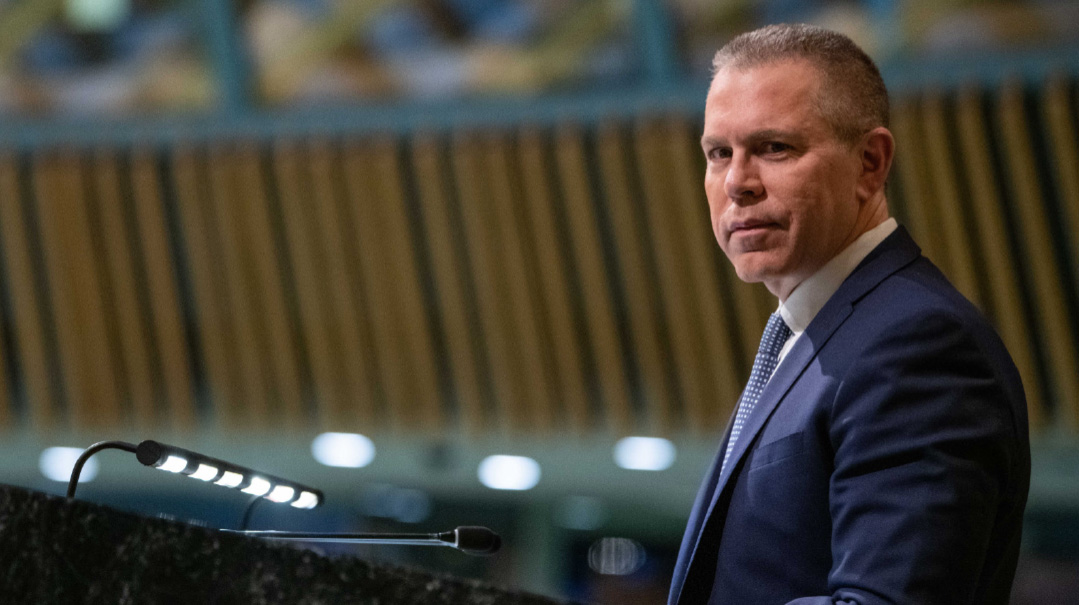Fingers of Blame

With Israel's streets riven, Bibi picks fights at home

1
One snapshot from last week’s “40-signature debate” seemed to perfectly encapsulate Prime Minister Binyamin Netanyahu’s dismal situation. In a plenum hall teeming with furious opposition MKs, Netanyahu is seen sitting alone at the government table.
Knesset protocol allows for a protest mechanism of sorts under which a minimum of 40 opposition MKs can convene an emergency session that the prime minister is required to attend, keeping him in the plenum for hours to hear one speaker after another haranguing him.
Such sessions are mostly just a way for the opposition to let off some steam, but the prime minister’s expression as he sits in the plenum for hours can provide an indication of the government’s mood — and the country’s.
Some two-thirds of Netanyahu’s Likud faction excused themselves from the debate, claiming prior commitments. But more prominent in their absence were Otzma Yehudit MKs, who spent the day touring the Evyatar outpost instead. United Torah Judaism MKs, who were in the building, barricaded themselves in their offices for hours and only agreed to participate in the vote after yet another cast-iron pledge from Netanyahu.
It’s hard to believe that Netanyahu’s sixth government, which resembles a burnt-out car from the Palestinian village of Huwara, only hit the road two months ago. It’s besieged by mass protests as if it were in its final days, the shekel is falling, and the economic outlook is as gloomy as the security situation. In his decade and a half in power, economic and security stability were Netanyahu’s crowning glory throughout his various governments. No more.
If Netanyahu had managed to convey at home and abroad that his coalition was internally stable, despite all the pressure, he could have treated the crisis as nothing more than birth pangs. But the internal tremors are no less threatening than the external ones. Like the first swallow heralding the approach of spring, deputy minister Avi Maoz of the extremist Noam party set the tone last week by sending in his letter of resignation after flagrant violations of his coalition agreement by Netanyahu.
Maoz was Netanyahu’s first mistake — and by no means the last — along the road to the crisis threatening his sixth government just two months in. Bibi promised Maoz control over extracurricular content in Israeli public schools, sending the left into hysterics — but in a pattern we’ve grown used to, it was a promise Netanyahu had no intention of keeping. Two months later, Netanyahu finds himself having burned his bridges to both the right and the left.
2
Maoz’s complaints are being echoed by all of Netanyahu’s coalition allies. Not just by Smotrich and Ben Gvir, of whom more later, but also by chareidi allies, usually considered the easiest going of Netanyahu’s partners.
For UTJ, Shabbos has always been the source of all blessings — and the primary avenue for venting coalition grievances. Shabbos desecration in matters under government responsibility has always been the reality in the secular State of Israel, but there’s a well-known Israeli political axiom that the honor of Shabbos only requires defending at opportune moments.
On Sunday morning, Netanyahu woke up to a blistering attack in Degel HaTorah’s journal, Yated Ne’eman, regarding train works on Shabbos. The catch? The decision to critique the government in Sunday’s issue was made on Leil Shishi — before the train works took place. There was a reason for this curious timing.
The state budget was to be approved on late Friday, shortly before Shabbos. Finance Ministry bureaucrats and ministers assembled for a white night of budget wrangling. But the chareidi representatives, deputy minister Uri Maklev of Degel HaTorah and Meir Porush of Agudas Yisrael, got the sense they were being served scraps, matanos l’evyonim.
The one who gave free rein to his feelings in Yated was Degel HaTorah chair Moshe Gafni. The day before the approval of the budget, he held his nose and oversaw the Knesset Finance Committee’s vote to fully fund the prime minister’s private residences. “Bibi didn’t even call to say thank you,” Gafni said later. Netanyahu expressed his gratitude — as usual — by violating his core coalition promises to UTJ.
For UTJ, budget allocations are never a sufficient pretext for protest. While Degel HaTorah vented its pique over the budget by standing up for the honor of Shabbos, Meir Porush got more creative, resigning as minister for Mount Meron on the grounds that he was given responsibility with no authority. As Chazal say, “Kedai hu Rabi Shimon lismoch alav b’sha’as hadchak [Rav Shimon is worthy of being relied upon in pressing circumstances].”
3
Netanyahu’s inability to keep his promises has always been his Achilles heel. The chareidim, who have learned to live with him despite his shortcomings, might be able to bite the bullet and stay in the coalition, out of awareness of the alternative.
But Netanyahu’s sixth government contains a wild card — Itamar Ben Gvir’s Otzma Yehudit. Throughout the various iterations of Israeli’s right-wing coalitions, far-right MKs —most of whom look like milquetoast moderates compared to Ben Gvir — have proven time and again that they have no qualms about drilling holes in their own boat to bring down their government without a thought for the future.
“What’s rattling this coalition is not Ben Gvir’s behavior, but Bibi’s character,” an Otzma Yehudit source told me. “He’s doing things behind our back that are simply beyond the pale. He stops the IDF’s arrests and preventative actions in Judea and Samaria, attends a summit in Jordan without consulting us, promises to freeze settlement construction, evacuates Jewish outposts, and violates the coalition agreement to give the national security minister authority over border police in Judea and Samaria.”
Ben Gvir exacted revenge by keeping his faction away from the 40-signatures debate while publicly criticizing the government’s diplomatic and security measures.
In private conversations, Bibi is making clear that he won’t allow Smotrich and Ben Gvir to run security policy, even at the price of a coalition crisis. Netanyahu was appalled by the settler riot in Huwara and implicit backing for it from Otzma Yehudit MKs, and his mood wasn’t improved when international condemnations started pouring in.
The Huwara episode has only strengthened Netanyahu’s resolve not to grant Ben Gvir any control of government policy. Bibi is confident that in the long run, he’ll be able to resolve the internal crisis and minimize damage without abandoning the security front to Ben Gvir.
Netanyahu, who sat down with Ben Gvir for a tense conversation, is counting on the fact that his extremist allies have no alternative. But counting on the radical right — the same people who winked at the Huwara rioters — to make rational decisions may not be a sound plan of action. If the government fails to serve out its term, it will have fallen victim not merely to the ruinous economic fallout of the judicial reform, but above all to its own contradictions.
(Originally featured in Mishpacha, Issue 952)
Oops! We could not locate your form.






